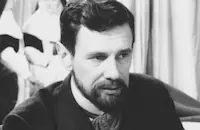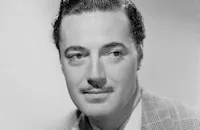King Rat

Brief Synopsis
Cast & Crew
Bryan Forbes
George Segal
Patrick O'neal
Todd Armstrong
Sammy Reese
Joseph Turkel
Film Details
Technical Specs

Synopsis
U. S. Corporal King is the opportunistic, cynical head of a black market operation in a Japanese prisoner of war camp on Singapore just before the end of World War II. In the camp are approximately 10,000 British, Australian, and American prisoners, most of whom outrank King, and all of whom are sick and emaciated. King maintains his own health through such methods as breeding rats and selling them as food to his fellow prisoners. He befriends British Flight Lieutenant Marlowe, who speaks Malay and thus can barter with the corrupt camp guards, and he saves Marlowe's life by paying a high price for stolen antibiotics. The provost marshal of the camp, Lieutenant Grey, King's implacable enemy, sees King's behavior as immoral and is constantly frustrated by his inability to catch King in black market deals. He is about to do so when the Japanese announce that the war is over. King and Marlowe go their separate ways, King rejecting Marlowe's offer of friendship now that the camp life ruled by King has ended.

Director

Bryan Forbes
Cast

George Segal

Patrick O'neal
Todd Armstrong
Sammy Reese
Joseph Turkel
Michael Stroka
William Fawcett
Dick Johnson
James Fox

Denholm Elliott
Leonard Rossiter
John Standing
Hamilton Dyce
Wright King
John Ronane
Geoffrey Bayldon
John Levingston
John Barclay
David Frankham

Tom Courtenay
David Haviland
Roy Dean

John Mills
Gerald Sim
Alan Webb
John Merivale
John Warburton

James Donald
Hedley Mattingly
Michael Lees
Reg Lye
John Orchard
Laurence Conroy
Arthur Malet

Edward Ashley
Richard Dawson
Dale Ishimoto
Teru Shimada
Louis Neervort
George Pelling
Anthony Faramus
Crew
Roy Baker
John Barry
Ken Bell
John Burke
John Cox
Joe Di Bella
James Z. Flaster
C. M. Florance
Bryan Forbes
Doug Grant
Burnett Guffey
Bill Kantor
Marie Kenney
Willard Klug
Ben Lane
Harold Lee
Andrew Mcintyre
Walter Meins
Clarence Peet
Charles J. Rice
James Saper
Russell Saunders
Ed Shanley
Robert Smith
Bob Templeton
Walter Thompson
Frank [a.] Tuttle
Ed Ware
Seldon White
James Woolf

Videos
Movie Clip



Hosted Intro
Film Details
Technical Specs

Award Nominations
Best Art Direction
Best Cinematography
Articles
King Rat
Written for the screen and directed by Bryan Forbes, King Rat is based on a novel by James Clavell, who was himself a POW in Singapore during WWII and reflects his own sense of truth; the movie's overall attention to detail is especially striking. Clavell started his film career by writing the sci-fi classic The Fly (1958). He also co-wrote the screenplay for The Great Escape (1963), wrote and directed the Sidney Poitier film To Sir, with Love (1967), and penned the novels Shogun and Tai-Pan.
Forbes, who has worked as actor, writer, director and producer, was nominated for a screenwriting Oscar® for The Angry Silence (1960) and later was one of several writers to work on Chaplin (1992). On King Rat, Forbes oversaw a talented crew which garnered two Oscar® nominations, for Black-and-White Cinematography (Burnett Guffey) and Black-and-White Art Direction (Robert Emmet Smith and Frank Tuttle). Both categories were won that year by Stanley Kramer's Ship of Fools (1965).
Forbes also directed all-around excellent performances from a talented cast. George Segal got the lead after Paul Newman and Steve McQueen turned it down; combined with his performance in Ship of Fools, 1965 was a banner year for the rising star. Tom Courtenay, James Fox, John Mills and Denholm Elliott (who had spent three years in a POW camp himself) turned in equally notable performances.
Critics were generally kind to King Rat. Variety observed that it was shot entirely on the outskirts of Los Angeles yet "has the feel and casting of an overseas pic." The trade paper described the film as "grim" and "very raw," praised "Burnett Guffey's outstanding B&W camera," and called the King character "the Sammy Glick of POW life." The New York Times noted the movie was occasionally "gruesome" but admired how "the sheer displays of horrors are vigorously and ruthlessly achieved, and the actors [are] unflinching."
As for King Rat's reception by audiences, Ellen Snyder, writing in Magill's Survey of Cinema, has summarized it well: "The American public stayed away. In 1965 the theme of moral failure and survival at any cost was a few years ahead of its time. The anti-Vietnam War protests had hardly begun and the American audience was not interested in a totally nonheroic portrayal of Allied POW behavior. It was not until the late 1960s, when the protests were gaining great momentum, that people began to see King Rat and make it into a cult film. However, even if historical events had not made its story popular and relevant to contemporary issues, the film would still be a classic because of its story, acting, directing, and cinematography."
Producer: James Woolf
Director: Bryan Forbes
Screenplay: Bryan Forbes, James Clavell (novel)
Cinematography: Burnett Guffey
Art Direction: Robert Smith
Music: John Barry
Film Editing: Walter Thompson
Cast: Corporal King (George Segal), Lt. Robin Grey (Tom Courtenay), Peter Marlowe (James Fox), Top Sgt. Max (Patrick O'Neal), Lt. G.D. Larkin (Denholm Elliott).
BW-135m.
by Jeremy Arnold

King Rat
Sir John Mills (1908-2005)
Born Lewis Ernest Watts Mills in Norfolk, England on February 22, 1908. His father was a headmaster of a village school in Suffolk, where Mills was raised. After secondary school, he worked as a clerk in a corn merchant's office while acting in amateur dramatic societies. Ever ambitious, he relocated to London in 1928 to find more work as an actor.
He took tap-dancing lessons and made his stage debut as a chorus boy in The Five O'Clock Girl at the London Hippodrome in 1929. Later that year, he joined an acting troupe that toured India and the Far East with a repertory of modern plays, musical comedies and Shakespeare. It was during this tour when he scored his big break - he was spotted by Noel Coward while in Singapore and promptly taken under the playwright's wing when he returned to London in 1931.
On his return, he starred on the West End (London's Broadway), in Coward's Cavalcade and earned the lead in a production of Charley's Aunt. His song and dance talents came in handy for his film debut, an early British musical-comedy The Midshipmaid (1932). His biggest hits over the next few years would all fall into the genre of light comic-musicals: Britannia of Billingsgate (1933), Royal Cavalcade (1935), and Four Dark Hours(1937). He scored a his first big part as Robert Donat's student in the MGM backed production Mills went on to play Robert Donat's Goodbye, Mr. Chips (1939). He developed some more heft to his acting credentials that same year when he made his debut at the celebrated Old Vic Theatre as Puck in A Midsummer Night's Dream.
He served briefly in the Navy, 1940-41, during World War II before receiving a medical discharge. When Mills returned to the screen, he began a great turn as the atypical sturdy, dignified Englishman ("English without tears" went the popular phrase of the day). He starred as a stalwart lead in a amazing string of hit films: In Which We Serve (1942), We Dive at Dawn (1943), This Happy Breed (1944), The Way to the Stars (1945), and Waterloo Road (1945). Although Mills was ever dependable, they did not show his breakout talents until he starred as Pip in David Lean's gorgeous adaptation of Charles Dickens' Great Expectations (1946). As the young orphan who morphs into a man of wealth and stature, Mills showed the depth as an actor by offering a finely modulated performance.
By the late '40s, Mills was a bona fide star of British films, and over the next decade the strong roles kept coming: as the ill-fated Robert Falcon Scott in Scott of the Antarctic (1948); Bassett, the handy man who tries to help a troubled child (the brilliant John Howard Davies) of greedy, neglectful parents in the superb domestic drama The Rocking Horse Winner (1950); an overprotective father who gets trapped in a murder yarn in Mr. Denning Drives North (1952); a fine Willie Mossop in David Lean's Hobson's Choice (1954); an impressive "against-type" performance as a Russian peasant in War and Peace (1956); a sympathetic police inspector coaxing the trust of a juvenile (his daughter Hayley) who knows the facts of a murder case in the underappreciated Tiger Bay (1959); a rowdy Australian sheep shearer in Summer of the Seventeenth Doll (also 1959); and arguably his finest performance - a Best Actor award at the Venice Film Festival for a hard-as-nails army colonel who fears the loss of control over his regiment in Tunes of Glory (1960).
The mid-60s saw an isolated effort as a film director: Gypsy Girl (which starred his other daughter Juliet - who would later find fame on US television in Nanny and the Professor (1970-72); and showed the development of Mills into a charming character actor: the working-class patriarch in the modest comedy The Family Way (starring Hayley as his daughter); and a terrific comic bit as a murderous Lord who tries to kill off his kin for the family inheritance in Bryan Forbes The Wrong Box (all 1966).
By the '70s, his film work slowed considerably, but he was always worth watching: an Oscar winning performance as a mute villager in David Lean¿s study of the Irish troubles Ryan's Daughter (1970); as the influential General Herbert Kitchener Young Winston (1972); and as a driven oil driller in Oklahoma Crude (1973). With the exception of a small role in Sir Richard Attenborough's Ghandi (1982 - where he was credited as Sir John Mills after his knighthood in 1976), and a regrettable cameo in the deplorable Madonna comedy Who's That Girl (1987).
Very little was seen of Mills until recent years, where the most memorable of his appearances included: Old Norway in Hamlet (1996); as the stern chairman opposite Rowan Atkinson in the hit comedy Bean (1997); and - in a daring final role for his proud career - a nonagenarian partygoing cocaine user in Stephen Fry's bawdy social satire Bright Young Things (2003)! Mills is survived by his wife of 64 years, the novelist and playwright Mary Hayley Bell; his daughters, Juliet and Hayley; son, John; and several grandchildren.
by Michael T. Toole
Sir John Mills (1908-2005)
Quotes
Trivia
Notes
Filmed on location in Thousand Oaks, California.

Miscellaneous Notes
Released in United States October 27, 1965
Released in United States Summer August 1, 1965
Released in United States Summer August 1, 1965
Released in United States October 27, 1965















